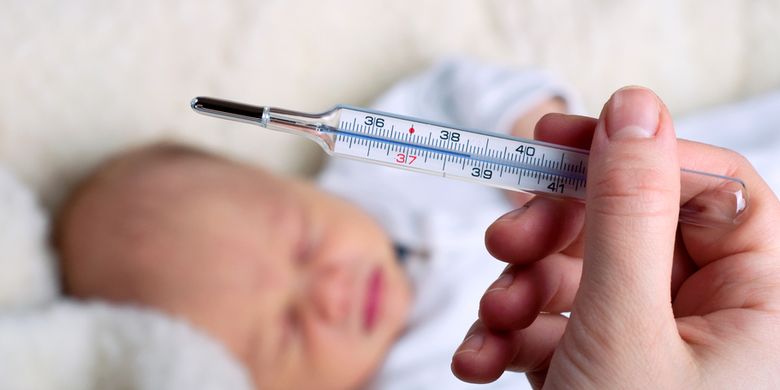KOMPAS.com – Heart disease congenital (CHD) is a term to describe various birth defects that affect the normal workings of the heart.
The term “congenital” means this condition is present from birth.
Most cases are thought to occur when something affects the development of the heart during the first 6 weeks of pregnancy.
Also read: 6 Symptoms of Congenital Heart Disease to Watch Out For
This is when the heart develops from a simple tube-like structure into a shape more like a fully formed heart.
Although several things are known to increase the risk heart disease congenital, but still no clear cause was identified in most cases.
Launch NHSThere are several things that can increase a child’s chances of suffering congenital heart disease.
Some of them, namely:
1. Genetic conditions
Several genetic health conditions that a baby inherits from one or both parents can cause congenital heart disease.
It is also known that some types of congenital heart disease run in families.
Down syndrome is the most widely recognized genetic condition that can cause congenital heart disease.
Also read: Characteristics of chest pain that leads to symptoms of coronary heart disease
Children with down syndrome born with various defects due to genetic abnormalities.
About half of all children with down syndrome have congenital heart disease.
In most cases, this is a type of septal defect.
Other genetic conditions associated with congenital heart disease include:
- Turner syndrome, namely a genetic disorder that only affects women. Many children with the syndrome will be born with congenital heart disease, which is usually a type of narrowing of the valve or artery
- Noonan syndrome, which is a genetic disorder that can cause a variety of potential symptoms, including pulmonary valve stenosis
2. Diabetes mother
Women with diabetes have a higher risk of giving birth to a baby with congenital heart disease than women who do not have diabetes.
Also read: 4 Symptoms of Gestational Diabetes in Pregnant Women to Watch Out for
This increased risk only applies to type 1 diabetes and type 2 diabetes. It does not apply to gestational diabetes, which can develop during pregnancy and usually disappears once the baby is born.
The increased risk is thought to be due to high levels of the hormone insulin in the blood, which can interfere with the normal development of the fetus (the early stages of development of the baby in the womb).
3. Consumption of alcohol
If a pregnant woman drinks too much alcohol during pregnancy, it can have a toxic effect on fetal tissues. This is known as fetal alcohol syndrome.
Children with fetal alcohol syndrome often develop congenital heart disease, most commonly having ventricular or atrial septal abnormalities.
Therefore, pregnant women are advised not to drink alcohol.
4. Rubella on mother
Rubella (German measles) is a contagious disease caused by a virus.
This disease is usually not a serious infection for adults or children, but it can severely affect the unborn baby if the mother develops an infection rubella during the first 8 to 10 weeks of pregnancy.
Also read: Different Types of Vaccines Needed by Children
Rubella infection can cause several birth defects, including congenital heart disease.
All women of childbearing age should be vaccinated against rubella.
Vaccines are now given as part of routine childhood vaccination schedules.
If you are unsure whether you have been vaccinated against rubella, do not hesitate to seek medical advice.
5. Flu ( influenza) on the mother
Women who catch the flu during the first trimester (3 months) of pregnancy are at greater risk of having a baby with congenital heart disease than those who don’t
The reasons are not clear. But for goodness sake, the flu vaccine is recommended for all pregnant women.
Also read: These 3 Diseases Lurk If You Don’t Wear A Jacket While Driving
6. Treatment side effects
There are several medications that have been linked to an increased risk of a baby being born with congenital heart disease.
This includes:
- Certain anti-seizure drugs, such as benzodiazepines (eg diazepam)
- Certain acne medications, such as isotretinoin and topical retinoids
- Ibuprofen, in which women who take the painkiller ibuprofen when they are 30 weeks pregnant or more have an increased risk of having a baby with heart problems
Paracetamol is a safer alternative to ibuprofen during pregnancy, although ideally you should avoid taking any medications while you are pregnant, especially during the first 3 months of pregnancy.
Don’t hesitate to talk to your doctor or pharmacist if you are not sure which medications to avoid during pregnancy.
7. Phenylketonuria
Phenylketonuria (PKU) or phenylketonuria is a rare genetic condition that is present at birth.
On the case phenylketonuria, the sufferer’s body cannot break down a chemical called phenylalanine, which is formed in the blood and brain. This can lead to learning and behavioral difficulties.
Also read: 9 Signs of Heart Disease Apart from Left-sided Chest Pain
Phenylketonuria can usually be treated effectively with a low protein diet and dietary supplements.
Pregnant women with phenylketonuria those who do not do this are more likely to have babies with congenital heart disease than the general population.
8. Organic solvents
Women exposed to some organic solvents may be more likely to give birth to babies with congenital heart disease than the general population.
Organic solvents are chemicals found in a variety of products and substances, such as paints, nail polishes and glues.
Types of congenital heart disease
Launch Health Line, although there are many types of congenital heart defects, they can be divided into three main categories.
Also read: 6 Types of Heart Disease and Their Symptoms to Watch Out for
Here’s the explanation:
1. Congenital heart disease with abnormalities in the valve
Valves in the heart that direct blood flow can close or leak.
This condition can interfere with the heart’s ability to pump blood properly.
2. Congenital heart disease with abnormalities in the heart wall
The natural walls that are between the left and right sides and the upper and lower chambers of the heart may not develop properly, causing blood to return to the heart or to accumulate where it shouldn’t.
These defects put pressure on the heart to work harder, which can lead to high blood pressure.
3. Congenital heart disease with abnormalities in blood vessels
The arteries and veins that carry blood to the heart and back to the body may not function properly.
This condition can reduce or block blood flow and lead to various health complications.
Also read: 5 Diseases Due to Excessive Sugar Consumption, Not Only Diabetes
Heart disease can also be classified into cyanotic and acyanotic congenital heart disease.
In both types, the heart doesn’t pump blood as efficiently as it should.
The main difference between the two types of congenital heart disease is that cyanotic congenital heart disease causes low oxygen levels in the blood, whereas acyanotic congenital heart disease does not.
Babies with reduced oxygen levels may experience shortness of breath and a bluish color on their skin.
Meanwhile, babies who have enough oxygen in their blood do not show these symptoms, but they may still experience complications later in life, such as high blood pressure.
Also read: 4 Symptoms of Coronary Heart Disease to Watch Out For
So, how do you treat congenital heart disease?
Treatment for congenital heart defects depends on the type and severity of the disorder.
Some babies have mild heart defects that resolve on their own over time.
Meanwhile, other people may have severe disabilities that can require extensive treatment.
In this case, treatment may include the following:
1. Take drugs
There are various drugs that can help the heart work more efficiently.
Some can also be used to prevent blood clots or to control an irregular heartbeat.
2. Implanted heart device
Some of the complications associated with congenital heart defects can be prevented with the use of certain devices, including pacemakers and implanted cardioverter defibrillators (ICD).
Pacemakers can help regulate abnormal heartbeats, and an ICD can correct life-threatening irregular heartbeats.
Also read: Identify 9 Signs of Danger in Newborns
3. Cardiac catheter procedures
Catheterization techniques allow doctors to correct certain congenital heart defects without surgically opening the chest and heart.
During this procedure, your doctor will insert a thin tube into a vein in your leg and direct it to your heart.
Once the catheter is in the correct position, the doctor will use a small instrument that is inserted through the catheter to repair the damage.
4. Open heart surgery
This type of surgery may be needed if a catheter procedure is not sufficient to correct a congenital heart defect.
A surgeon can perform open-heart surgery to close a hole in the heart, repair heart valves, or widen blood vessels.
Also read: 12 Foods High in Antioxidants
5. Heart transplant
In rare cases where the congenital heart defect is too complex to repair, a heart transplant may be necessary.
During this procedure, the child’s heart is replaced with a healthy heart from a donor.
– .


:quality(80)/cdn-kiosk-api.telegraaf.nl/7a952ba2-3230-11eb-a73e-0255c322e81b.png)